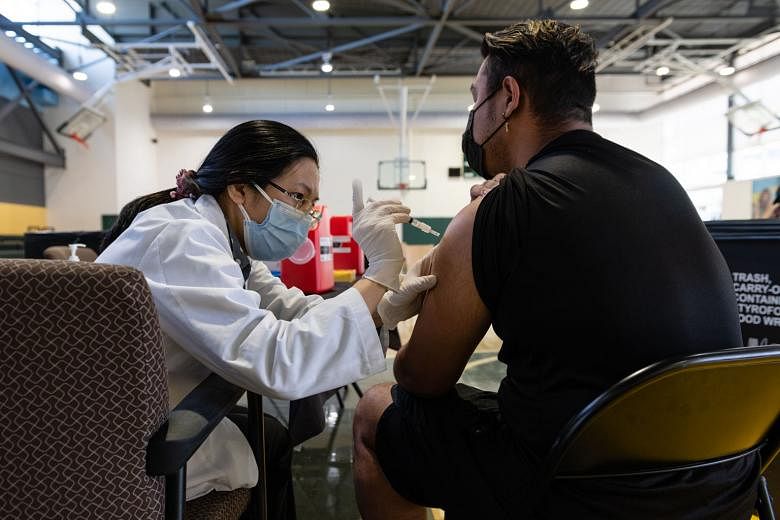WASHINGTON • US President Joe Biden wants 70 per cent of American adults to have received at least one shot of a Covid-19 vaccine by the July 4 holiday, and has made vaccinating adolescents a key part of the next phase of the country's immunisation campaign.
In a speech at the White House, Mr Biden said he was launching a new phase in the fight against the coronavirus, with a goal of at least partly vaccinating 70 per cent of adults by Independence Day and with a personal plea to all of the unvaccinated: "This is your choice. It's life and death."
After three months of battling supply shortages and distribution bottlenecks, the Biden administration is confronting a problem that the President said was inevitable: Many of those who were most eager to get vaccinated have already done so.
Vaccination sites at stadiums once filled with carloads of people seeking shots are closing and states that once clamoured for more vaccines are finding that they cannot use all of the doses that the federal government wants to ship to them.
The administration now wants tens of thousands of pharmacies to allow people to walk in for shots. It has ordered up pop-up and mobile clinics, especially in rural areas, and it plans to devote tens of millions of dollars for community outreach workers to provide transport and help arrange child care for those in high-risk neighbourhoods who want to be vaccinated.
To build confidence in vaccines, federal officials plan to enlist the help of family doctors and other emissaries who are trusted voices in their communities.
President Biden's address comes as the nation's immunisation campaign is stalling after hitting a peak early last month. More than 56 per cent of adults have received one or more shots, but as the rate of uptake falls, officials are devising new ways to reach vaccine hold-outs.
The federal government is also working on a programme with pharmacies and paediatricians nationwide to reach the country's estimated 17 million 12-to-15-year-olds ahead of school reopening in the fall.
But targeting US teens is a controversial move among many experts, who argue that it is a serious mistake to use the world's limited supply of doses on a low-risk population while the pandemic surges in countries like India and Brazil.
Pfizer and its partner BioNTech said in March their two-dose regimen was shown to be safe and highly effective in a trial of 2,260 12-to-15-year-olds.
An emergency-use authorisation is expected in the coming days, and Mr Biden told White House reporters on Tuesday that "if that announcement comes, we are ready to move immediately".
The issue of vaccine disparity has been brought into sharp focus by India, which reported 350,000 new cases on Tuesday and recorded nearly 3,500 deaths - more than anywhere in the world.
Ms Priya Sampathkumar, chair of Infection Prevention & Control at Mayo Clinic in Minnesota, said that beyond being an ethics issue, exporting more vaccines was in America's own best interest.
"Vaccinating more people in the US is not going to help us if the variants in India, Nepal and South Asia get out of control and hit our shores," she said.
The US has pledged to release up to 60 million doses of the Astra-Zeneca vaccine, but the experts believe much more can be done.
Ms Sampathkumar said the main reason to vaccinate teens is to drive down transmission - a goal which she agreed with, though with US cases declining, it is a question of timing.
Statistics show children are at extremely low risk from severe Covid-19. In the United States, under-18s have accounted for 277 deaths in total, according to the latest official data, a miniscule fraction of the total of 574,000. There have been a further 36 deaths from multisystem inflammatory syndrome in children (MIS-C), a rare but serious post-viral disease.
Still, low risk is not no risk, and paediatrician Lee Beers, president of the American Academy of Paediatrics, welcomed the arrival of a vaccine for children. She called vaccinating teens "an important tool in our toolbox for safe return to schools", saying it may "increase the comfort for many families and school staff".
But Dr Jennifer Nuzzo, an epidemiologist at Johns Hopkins, said the government's own research had shown it is entirely possible to reopen schools safely without vaccines. "It's just another barrier that's been falsely erected to stand in the way of returning kids to education," she stressed.
Dr Nuzzo said global hotspots should be the priority, adding: "It's not good for kids in the long run if we just let this virus spread unchecked across the globe."
AGENCE FRANCE-PRESSE, NYTIMES

